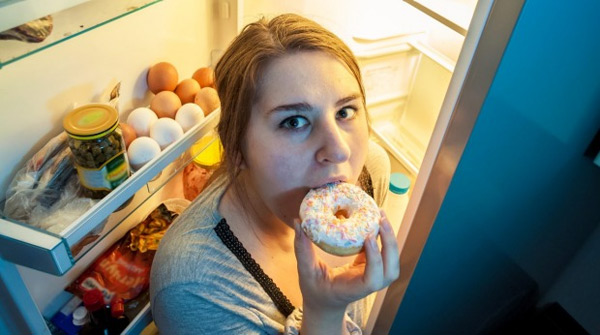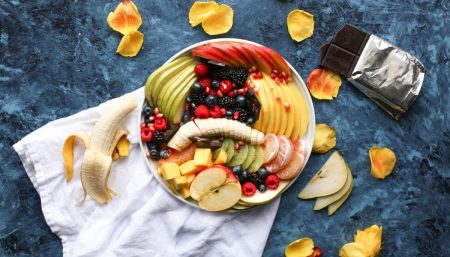Late-night snackers and fast- eaters are more likely to gain weight.

For those people who work night time hours or who wake in the middle of the night to enjoy a midnight snack, this means that you are more likely to become overweight or obese based on your habits alone.
The human body is governed by hormonal fluctuations and routines, also called the circadian rhythm that essentially ensure we eat at the right times during the day. Since our energy needs are greater, it is essential that we offer our bodies’ ample caloric intake to fuel our activities.
If we eat at odd times such as at night, we kick off a hormonal imbalance where too much ghrelin (the feed me hormones) and not enough leptin (the I am full hormone) are produced. These hormones are the rulers of our appetite and feelings of being satisfied and wreak havoc on our metabolism when thrown out of sync.
Some people are convinced that not eating after 7 p.m. helps them to lose weight and keep the weight off. Whether or not this strategy works for everyone, nutritionists are offering some advice on how people who are interested in this approach can best accomplish it.
Similarly, the rate at which a person eats affects how many calories he ingests. There have been two researches in 2008 but perhaps the most intriguing research is this year’s study published in the Journal of Clinical Endocrinology and Metabolism by Kokkinos et al. This research gives us a better understanding of the underlying physiological effect of eating speed. According to research findings, eating at speed affects certain hormone levels in our body, which in turn interact with the hypothalamus to create the feeling of hunger or fullness. The hormones PYY, GLP-1, and Ghrelin all play a role. Kokkinos found that levels of both PYY and GLP-1 are significantly higher in the body when a person eats slowly. These two hormones cause a person to feel full. It was found that Ghrelin levels were higher two hours after eating for those who ate quickly. Ghrelin causes the feeling of hunger. This research supports the previous studies. It seems hormone levels are responsible for the fullness slow eaters feel and the hunger fast eaters feel. What’s interesting is that fast eaters feel both less full after eating more food and hungrier just a couple hours after eating than do slow eaters.
Of course, if you can change your eating habits and begin to eat in time and more slowly, chewing your food 20-30 times before swallowing, then you will likely begin to eat fewer calories. More importantly, you will actually feel full after your meal, and you will go longer before feeling the need to eat again. It could be that modifying eating time and speed is the best dieting tip anyone could give. So take a hint from these studies and start eating slowly!
| If you don’t eat before mid-morning (around nine or ten o’clock), you are probably skipping breakfast. A good breakfast should contain a good dose of fiber and protein to keep you satisfied until lunch time. |
Tips to adopt healthy eating pattern

- Always eat breakfast, lunch and dinner, and not to skip any meals. And if you get hungry during other times of the day, you can add in some snacks or even divide the meals into smaller ones to be eaten more frequently.
- Stay hydrated throughout the day
- Make sure to schedule and eat dinner early.
- Make breakfast the largest meal of the day and dinner the smallest.
- Brush your teeth after meals to curb appetite, as well as keep your teeth healthy, so doing this right after dinner will help you to resist the temptation to eat late.
- Keep busy at night, it helps. Rather than just sitting around in boredom, experts suggest playing a game, taking a walk, or engaging in some other activity or exercise to keep your mind busy so that it will focus on things other than food.
- Avoid processed sugars and eat nutrient-dense, protein-rich foods. Snack on things like nuts and seeds throughout the day rather than chips and crackers, for instance, will not only provide more sustained energy, but it will provide better nutrition for maintaining a healthy weight.
- If you are eating at night to unwind, calm emotions, or relax yourself, focus on getting in touch with what’s going on emotionally when you go for the fridge. Develop non-food methods of dealing with stress.
- Eat without engaging in any other simultaneous activity, i.e., no reading.
- If you’re up late burning the midnight oil, snack on “free” foods. These are foods that, don’t have health benefits, are very low fat, low-calorie snacks and are almost harmless. These include sugar-free Jell-O (10 calories) and sugar-free chocolate pudding (60 calories). Need something crunchy and salty? Try trans-fat-free microwave popcorn.
Related Links
Disclaimer
The Content is not intended to be a substitute for professional medical advice, diagnosis, or treatment. Always seek the advice of your physician or other qualified health provider with any questions you may have regarding a medical condition.



